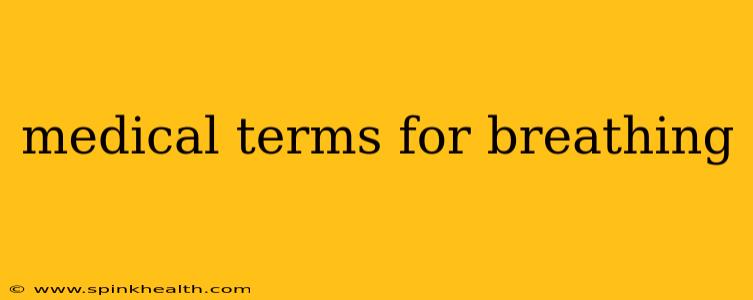Decoding the Breath: A Journey Through Medical Terminology for Respiration
The simple act of breathing, something we take for granted every second of our lives, becomes incredibly complex when viewed through the lens of medical terminology. This seemingly straightforward process is, in reality, a finely tuned orchestration of muscles, nerves, and organs, each with its own specialized vocabulary. Let's embark on a journey to understand the rich language doctors use to describe the mechanics and potential problems of respiration.
What are the different medical terms for breathing?
This is a fantastic starting point, as it encompasses the breadth of terminology we'll explore. The simple word "breathing" itself has many medical synonyms, each with subtle nuances:
- Respiration: This is the most encompassing term, referring to the entire process of gas exchange – the intake of oxygen and the expulsion of carbon dioxide.
- Ventilation: This specifically refers to the mechanical process of moving air into and out of the lungs. Think of it as the "pumping" action.
- Oxygenation: This focuses on the uptake of oxygen into the bloodstream from the lungs. It's a crucial aspect of respiration, but not the entire process.
What are the medical terms related to difficulty breathing?
Difficulty breathing, or dyspnea, manifests in various ways, each with its own precise medical description:
- Dyspnea: The general term for shortness of breath. It's a subjective feeling, meaning it relies on the patient's report.
- Orthopnea: This refers to shortness of breath that only occurs when lying down flat. Patients often need to sleep propped up with extra pillows.
- Apnea: The complete cessation of breathing, even temporarily. This can be a serious condition. Sleep apnea, for example, is characterized by repeated episodes of apnea during sleep.
- Tachypnea: Abnormally rapid breathing. This is often a sign of underlying illness.
- Bradypnea: Abnormally slow breathing. This can indicate a problem with the respiratory control center in the brain.
What are the medical terms for fast breathing?
As mentioned above, tachypnea is the medical term for fast breathing. However, understanding why someone is breathing rapidly requires considering the context. Fast breathing can be a response to:
- Exercise: Increased physical activity naturally leads to increased respiration rate.
- Anxiety: Stress and anxiety can trigger hyperventilation, characterized by both rapid and deep breathing.
- Fever: A higher body temperature increases the metabolic rate, necessitating faster breathing to meet oxygen demands.
- Lung disease: Conditions like pneumonia or asthma can cause rapid breathing as the body struggles to get enough oxygen.
What are some other important medical terms related to breathing?
The respiratory system is a complex network, and understanding its components requires a specialized vocabulary:
- Pulmonary: Relating to the lungs. For example, "pulmonary edema" refers to fluid buildup in the lungs.
- Bronchi: The main air passages leading into the lungs. Bronchitis is an inflammation of these passages.
- Alveoli: The tiny air sacs in the lungs where gas exchange actually occurs.
- Diaphragm: The major muscle involved in breathing. It contracts to draw air into the lungs and relaxes to expel it.
- Intercostal muscles: Muscles between the ribs that assist in breathing.
Understanding medical terminology related to breathing is not just for healthcare professionals. As patients, having this knowledge empowers us to better communicate with our doctors, understand diagnoses, and participate actively in our own healthcare. This vocabulary allows for more precise descriptions of symptoms and a clearer understanding of the complexities of this vital life function.

